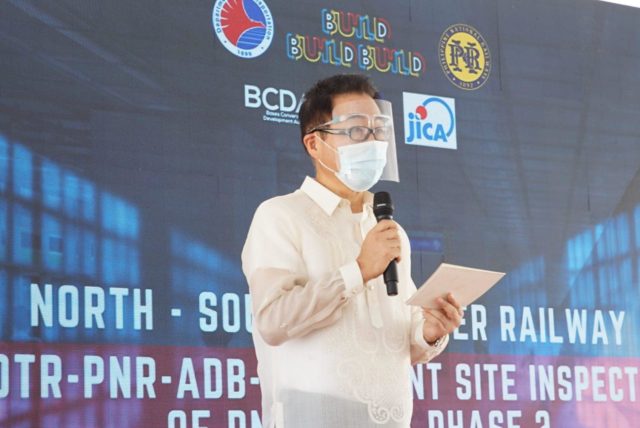Japanese Ambassador Koshikawa Kazuhiko lauds the Philippine government for the progress of the North-South Commuter Railway project amid the pandemic. (DOTr)
CLARK — Development partners laud Department of Transportation (DOTr) for the start of the Malolos-Clark segment of North-South Commuter Railway (NSCR) despite the challenges of the pandemic.
During the site inspection of the project which is also known as PNR Clark 2, Asian Development Bank (ADB) Country Director Kelly Bird shared that they approved the project in 2019.
“Almost 12 months later, DOTr was able to award five large contracts worth USD2.4 billion. That was also done on record time. With this, ADB always remains committed to the Philippines as a host country and we will always support the Philippines not only to overcome the current challenges with Covid but also on its journey to becoming an upper middle-income country very soon,” Bird said.
For his part, Japan International Cooperation Agency (JICA) Chief Representative Eigo Azukizawa commended the strong leadership of Transportation Secretary Arthur Tugade and the DOTr’s strong collaboration with its partner agencies which led to the realization of the project.
“We congratulate DOTr and Philippine National Railways for making the province of Pampanga the first segment to conduct this kind of ceremony within the span of NSCR expansion project. This is one of the prime examples of JICA-ADB partnership in infrastructure financing. We were amazed by the fast progress of the project amidst the pandemic,” he said.
He added that JICA is honored to be part of this highly valued and game changing initiative of the government in the era of the golden age of infrastructure.
With this, he expressed confidence in the successful outcome of the project, and committed JICA’s continuous support through the transfer of Japanese technology, knowledge, and introduction of Japan’s best practices in the country.
“With this, we aim to build the capacity to sustain development and provide the general public with reliable transportation services that will continue to be appreciated for the generations to come,” he furthered.
Meanwhile, Japanese Ambassador Koshikawa Kazuhiko said the project is symbolic of the Japanese-Philippine collaboration, and is very important to provide an efficient mass transportation for the benefit of many Filipinos.
Despite the challenging pandemic, he said the strong leadership of Secretary Tugade makes it possible to launch important milestones in the transportation project one after another.
He said the first outbound high-speed railway in the Philippines is seen to enhance functionality of Clark International Airport; as well as boost connectivity and the convenience of commuting for those living in the surrounding area of Metro Manila.
“Besides transfer of technology and maintenance knowledge, the development of Filipino human capital for railway operations are promoted. With this, we commit our continuous support to President Duterte’s Build Build Build program. We will further promote cooperation such as the procurement and development of railway system,” the envoy said.
Aside from being the Philippines’ single largest railway project, NSCR also holds the distinction of being ADB’s single largest infrastructure project and JICA’s longest commuter railway project.
Once operational, PNR Clark 2 will cut travel time from Malolos to Clark from the current 1.5 to 2 hours, to just 30-35 minutes. It has six stations namely Calumpit, Apalit, San Fernando, Angeles, Clark, and Clark International Airport.
This project is part of the massive 147-km NSCR, which will have 35 stations, and shall operate 464 train cars, with 58 8-car train sets configuration.
As of July 2021, PNR Clark Phase 2 recorded an overall progress rate of 32 percent, while PNR Clark Phase 1 (Tutuban to Malolos segment), is now 48 percent complete.
PNR Clark project features the country’s first-ever airport railway express service, which aims to unlock economic growth and employment potentials of Central Luzon. (CLJD/MJSC-PIA 3)





